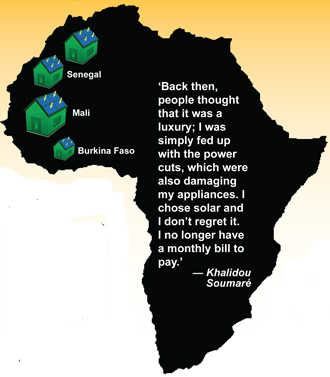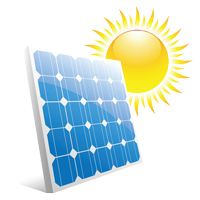Africa - Solar panels light up remote villages
By Koffigan E. Adigbli | Last updated: Nov 21, 2011 - 11:54:54 AMWhat's your opinion on this article?

|
Promoters of solar panels say more than 80 villages in Senegal are already benefiting from this renewable energy source; in neighboring Mali, more than 150 communities are enjoying solar power.
According to solar manufacturer Sustainable Power Electric Company (SPEC), based in Senegal, photovoltaic cells, or solar panels, have been a potential solution for electrification in rural areas for years, with only the relatively high cost of installation preventing widespread adoption in West Africa.
But Mamadou Saliou Sow, director of SPEC, explains that a generous subsidy is now bringing the panels within reach of many more in Senegal.
“A square meter of photovoltaic cells previously cost 650,000 CFA francs (around $1,350), but with a subsidy from the government of more than four billion CFA (around $8.3 million), we have reduced this. Now one can get panels and the hardware needed to install them for 300,000, even 250,000 CFA ($520),” Mr. Sow told IPS.
“And solar panels also have a long life span after installation; they can last eight or ten years or more.”
SPEC manufactures panels with outputs ranging from 50 watts to more than 300 watts, meaning they can meet nearly all needs. As well as providing lighting in homes and schools, solar panels are powering fridges, improving security, and supporting small collective enterprises and mini-power plants.
In the village of Kidira, in eastern Senegal, not far from the border with Mali, livestock owners were experiencing worrying levels of theft. Amadou Dia, a teacher at the local secondary school, says the villagers turned to solar power to light up their stock enclosures at night.
“People here are mostly livestock herders, but there was a series of stock thefts. They dipped into their own pockets, contributing 50,000 CFA per household (a little more than $100), to get solar lighting,” he told IPS.
Shakir Sow lives in the area, but he opted to go it alone. He spent more than a million CFA ($2,000) to install solar panels at his house, but he is not complaining at the cost.
“With the installation of a photovoltaic kit, my animals are protected; and my children who are in school can also study thanks to the light. And now we have a television to follow the news. I’m a modern herdsman,” he said.
SPEC also operates in neighboring Mali, alongside another provider, Sahel Energie. In Dindiéri, in the east of the country, nearly all the houses enjoy solar energy.
“I spent 680,000 CFA ($1,417) to get my solar panels. This provides power for the whole house and a bar, as well as two televisions, lamps and two fridges,” said Moutakilou Bangoura, a young trader from Dindiéri.

|
Khalidou Soumaré, an official with the Kayes municipalitiy, told IPS that he has used solar panels in his house for 10 years.
“Back then, people thought that it was a luxury; I was simply fed up with the power cuts, which were also damaging my appliances. I chose solar and I don’t regret it. I no longer have a monthly bill to pay,” said Mr. Soumaré.
“What’s still a problem is getting spare parts for the device which stores solar power (in a battery). We used to buy them in Bamako (the Malian capital); now you can get them here, although sometimes the traders try to outdo each other.”
According to Mr. Soumaré, there are also non-governmental organizations working to improve access to electricity in rural areas. For example, in 2009 the Monaco Red Cross installed a mini-solar power plant consisting of twelve 50-watt panels in Kayes, to support the recharging of 400 individual lamps owned by families.
“Each user receives a lamp, and can recharge it at the central point whenever they want for a monthly subscription fee of 700 CFA ($1.45). The revenue from this pays for a technician and for any maintenance,” Mr. Soumaré said.
“This approach has the advantage of making solar electricity immediately available to families who don’t have the resources to buy a photovoltaic kit.”
In Boulsa, a village in the Koupèla commune in southern Burkina Faso, a French organization called Soleil et Développement (Sun and Development) helped 102 women install solar panels in their houses in 2009. The women have put the electricity to good use, forming a collecting which processes grain for sale.
“Solar energy can contribute effectively to the reduction of household energy bills,” says SPEC director Sow. He believes the world’s energy future is inconceivable without renewable energy, and solar power in particular.
INSIDE STORIES AND REVIEWS
-
-
About Harriett ... and the Negro Hollywood Road Show
By Rabiah Muhammad, Guest Columnist » Full Story -
Skepticism greets Jay-Z, NFL talk of inspiring change
By Bryan 18X Crawford and Richard B. Muhammad The Final Call Newspaper @TheFinalCall » Full Story -
The painful problem of Black girls and suicide
By Charlene Muhammad -National Correspondent- » Full Story -
Exploitation of Innocence - Report: Perceptions, policies hurting Black girls
By Charlene Muhammad -National Correspondent- » Full Story -
Big Ballin: Big ideas fuel a father’s Big Baller Brand and brash business sense
By Bryan Crawford -Contributing Writer- » Full Story






 Click Here Stay Connected!
Click Here Stay Connected!








